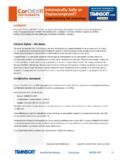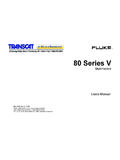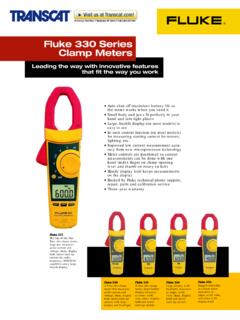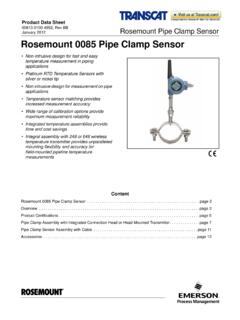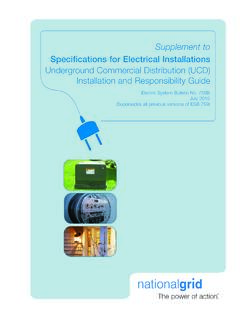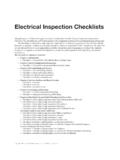Transcription of Intrinsically Safe or Explosionproof?
1 1 Better By Every Measure Ref: ID1002 , CorDEX Instruments Ltd. 2010 Understanding the technologyIntrinsic Safety the basicsThe term Intrinsically safe ( ) is frequently used to describe any product destined for an explosive area. In reality, is a protection concept based around limiting the available electrical energy to nonincendive levels so that sparks cannot occur from short circuit or failures which could cause an explosive atmosphere to ignite. A typical fixed circuit would comprise a device such as a temperature sensor permanently located within the explosive area, which is in turn protected by a safety barrier located in the safe area. These barriers usually incorporate a series of diodes, resistors and fuses arranged and sized in such a manner that they limit the energy provided to the device in the field.
2 Interestingly, the inclusion of a barrier in the control loop does not allow any device to be connected downstream. Even though the power may be limited, the device located within the explosive area itself must also be designed to comply with the requirements of various regulatory standards depending upon the geographical locale of the standardsAcross the world, there are differing regulations and requirements which dictate how products are designed, developed, certified and manufactured in order to be sold to a customer as examples of standards are: Europe:- EN60079-1:2007 United States:- Factory Mutual - FM3610 Canada:- CSA NO each of these standards defines the requirements for a device to be certified as , the requirements of each are different. These differences range from the effects of static build-up on non-metallic casings to the assessment of cells, even the test parameters themselves may be bottom line is that it is not possible to claim a product certified as Intrinsically safe in Europe to EN60079-XX (ATEX) can be deemed as Intrinsically safe certified in the United States or Canada and vice versa.
3 For each country, the device should be tested in accordance with the local tested and certified, products are marked as part of their safe orExplosionproof?SUMMARYThe phrase Intrinsically safe is often used generically to describe products destined for hazardous (explosive) areas. This paper explores the term Intrinsically safe , provides an overview of what is required to certify a product and compares Intrinsic Safety against Explosion Protection By Every Measure Ref: ID1002 , CorDEX Instruments Ltd. and Canadian StandardsClass I, Division 1, Groups A, B, C, D; Class II, Groups E, F, G; Class IIICSA C & US Mark: United States and Canada Safety StandardsAn electrical , mechanical or electro-mechanical product bearing the North American CSA Listing mark signified that it was tested and meets the minimum requirements of prescribed safety standards.
4 Moreover, the mark indicates that the manufacturer s production site conforms to a range of compliance measures and is subject to periodic follow-up inspections to verify continued compliance. A CSA Listed device with both US and C labels at the lower left and lower right of the CSA mark respectively, signifies that the product bearing the mark complies with both and Canadian product safety standards. United Kingdom and EuropeZone 0, 1, 2; Group IIC, IIB, IIA, IThe Ex Hexagon mark: United Kingdom and Europe Safety StandardsIntrinsically safe devices covered by the ATEX Directive can be separated into two distinct options notably Ex ia and Ex ib devices. Devices with the former designation are designed to be safe even after a second order failure of the safety system and are suitable for use in Zone 0 hazardous (explosive) areas.
5 Ex ib devices are designed to operate after a first order failure and as such are suitable for Zone 1 hazardous (explosive) to the CSA mark described above, a product bearing the Ex Hexagon has not only been designed and tested to meet the minimum requirements of the relevant ATEX safety standard but also the production facility has sufficient controls to ensure safe manufacture of the device itself. Annual audits are carried out by safety bodies to ensure that these standards are being adhered to and products designed are safe . ExceptionsAs with any rule, there are of course, exceptions! Let s assume that we have plant located in the United States comprising of a Class 1 Div I (B) hazardous (explosive) area. We need to take photographs within that area to document equipment during normal operation.
6 Ideally, the device used should have been certified to the local standard which defines the requirements for safety. However, what if no such device exists? What are our options?Option 1:Use a standard off-the-shelf digital camera. This can be done, but requires significant time and effort to raise hot-work permits, risk assessments and method st atements plus supplementary safety equipment such as gas detectors to use the 2:Attempt to obtain a device that holds a certification similar or greater than that of the hazardous area. For example, an ATEX certified digital camera has been tested for use in explosive areas; these tests were performed to European standards but the safety features of this device obviously exceed those of an off-the-shelf camera. Our plant safety officer would need to assess the camera and its certification along with the task required of it to determine acceptability but this is normally a one-time task rather than raising permits for every trip following Option By Every Measure Ref: ID1002 , CorDEX Instruments Ltd.
7 2010 Explosionproof technology why use it??Okay, so equipment is usually light, compact and robust, everything we need for a portable device. So, why would anyone want to use explosionproof (XP) as a protection concept?The answer is simple: power. With an system the entire power of the system - which includes but is not limited to the batteries is controlled. This means that inductive and capacitive loads are also assessed to the extent that they cannot cause a limitations can cause problems when a device needs to operate in a power range higher than allowed. High Voltage Switchgear for example could never be considered as the power in the conductors is far higher than that accepted by the standard. Similarly, high energy components such as a camera flash cannot be part of an device as the flash itself is powered by a capacitor which has a discharge greater than using XP as a protection concept, high power devices can be used safely in an explosive area.
8 The XP device itself is designed and tested to contain any explosion which may occur within, protecting the operator and the facility from requirements XP devicesFrom a basic design standpoint, an explosionproof device must be able to withstand an explosion within the enclosure and allow escaping gas to cool as it expands and passes through the flamepaths transiting from inside the enclosure to the environment outside. These flamepaths are carefully calculated and manufactured to extreme tolerances in order to achieve the desired cooling effect. XP devices must be serviced by qualified personnel with appropriate tools. If any flamepaths are disturbed then they need to be rechecked in accordance with the certificate, using calibrated requirements for XP may include material selection for device casings.
9 Some materials are specifically prohibited within explosive areas magnesium for example and even common materials such as aluminium must have a metallurgical makeup within a specific range. Polymers are generally not used for XP devices as the requirements for material selection, in addition to anti-static properties, are extremely difficult to :- Did you know that a nylon camera neck strap may not acceptable within an explosive area? The static charge built up may be sufficient to cause a to the higher power of XP devices and their inherent safety with respect to containing any explosion, an XP device is generally heavier that an IS device. However, the additional functionality provided by using the XP protection concept means that the operator can complete tasks otherwise difficult, if not impossible, with IS.
10 A good example would be a camera flash. Using an digital camera in low light situations would mean that the imagery would be extremely poor by virtue of no flash. To achieve good imagery in this environment, a high energy flash is needed and the only way to achieve this functionality is to use the XP protection By Every Measure Ref: ID1002 , CorDEX Instruments Ltd. 2010 Static discharge shocking!A major design requirement for European certified (ATEX) devices is to select and test any non-metallic enclosure part for its ability to dissipate electrical energy and hence be termed anti-static . This is known as surface resistivity testing and is a major part of any product design. Often overlooked in favour of the electric-mechanical part of an hazardous area system, the anti-static properties of polymer bodies is a huge contributing factor to any device operating in a hazardous area defined by the ATEX Directive in particular.
